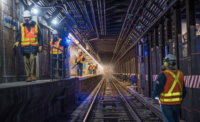Discussed and debated for decades, the vision of a freight rail tunnel across New York City’s harbor recently took a small step forward: The Federal Highway Administration and the Port Authority of New York & New Jersey now are able to conduct environmental reviews on two preferred alternatives—a rail tunnel and a floating railcar option. The moves follow a so-called Tier 1 record of decision, issued in December by the U.S. agency.
FHWA pared down 27 original alternatives to five waterborne options, five rail-tunnel alternatives and a no-build possibility, noted John Formosa, the agency’s major projects manager in New York City, in an update late last month to members of the Transportation Research Forum’s New York chapter.
Estimated to cost $4 billion in 2003 (ENR 4/21/03 p. 9), the tunnel would connect the city to the existing freight rail network and allow trains to avoid traveling 280 miles north to Albany to reach the eastern side of the Hudson River.
Trucks carry 95% of all freight in the region. A rail tunnel would accommodate double-stacked container railcars in both directions, between Greenville Yard in Jersey City, N.J., and the Long Island Rail Road in the Bay Ridge section of Brooklyn. The railcar float operation would expand existing service between Greenville Yard and the 65th Street yard in Brooklyn and re-establish an operation to another yard in the borough.
The project received a boost with the passage of the FAST Act, which authorized $4.5 billion in discretionary funds and $6.3 billion in formula funding for freight infrastructure.
Public meetings began in 2010, said Formosa. “We have set aside some $14 million for the completion of the Tier 1 record-of-decision effort for the Cross-Harbor Freight Improvement Program,” he added in a follow-up interview. “Included in this $14 million is $11.2 million of federal-aid funding from the original congressional earmark of $100 million. The remainder of this earmark will be expended to restore a state of good repair to the current float operation,” he added.
“We are [now] getting into the business of freight,” Formosa pointed out, echoing a comment by U.S. Dept. of Transportation Secretary Anthony Foxx on the historical lack of a national freight policy.



Post a comment to this article
Report Abusive Comment